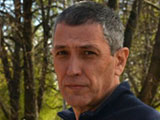The Wind of Thinking
by Israel Centeno / June 4, 2014 / No comments
Hannah Arendt, evil, and the freedom of digressive thought.

Photo: pareeerica via Flickr.
What is evil? This is mankind’s fundamental question, asked and challenged by religions and ideologies; the question of the thinker who sees himself as free and engages in a dialogue with himself. For a long time, evil was anything that was disagreeable to the masses; anything different or unusual. Something unrecognizable, or what no one wanted to recognize. For the Athenians, evil was found outside of Athens—anything barbaric that had not been assimilated by Rome. For the Jews, it was the gentiles; for the Muslims, the infidels; for the Christians, the heretics and nonbelievers.

- From his lonely watch post Albert Camus asked who among us has not experienced exile yet still managed to preserve a spark of fire in their soul. “We’re all alone,” Natalia Sedova cried in exile on hearing of her husband Leon Trotsky’s affair with Frida Kahlo. In his novel Night Watch, Stephen Koch follows the incestuous love affair of David and Harriet, wealthy siblings watching the world from their solitary exile. Koch’s writing, Camus’s theories, and Trotsky’s affair all come back to exile and lead me to reflect on the human condition. From my own vantage point, my Night Watch, I will reflect on my questions of exile, writing, and the human condition.

- Israel Centeno was born in 1958 in Caracas, Venezuela, and currently lives in Pittsburgh as a Writer-in-Residence with City of Asylum/Pittsburgh. He writes both novels and short stories, and also works as an editor and professor of literature. He has published nine books in Venezuela and three in Spain.
Even in modern times, there are good people and bad people. These two entities are opposites, to the point that they cancel each other out. Hate is negative. Desire counteracts hate and exterminates it.
We may consider these assertions to be reasonable, though they make us feel a little uncomfortable. Nevertheless, it’s still difficult to process, and even difficult not to have, or want, the will to understand the following daring assertion, made by Hannah Arendt:
“Although we know that human beings are capable of thinking—of having intercourse with themselves—we do not know how many indulge in this rather profitless enterprise; all we can say is that the habit of thinking, of reflecting on what one is doing, is independent of the individual’s social, educational, or intellectual standing.”
Simple as that, evil is brought to life through a man or woman’s inability to think. And, sometimes, often, man and woman, as part of a social mechanism, don’t think. They don’t reflect. They don’t choose.
When Arendt attended the trial of Adolf Eichmann, who was accused of genocide as one of the officers in charge of the Final Solution, she reported that he did not appear to be depravity personified. He did not emerge filthy and foul-smelling from the bowels of Nazi hell, bearing fangs, cloven hooves, and devil horns. Rather, he seemed like an ordinary man: Run of the mill, average, and insignificant. The great enemy of humanity was a nobody; a civil servant who, incapable of independent thought, never questioned an order. He didn’t think about the inherent evil in systematically exterminating other people because they were different. He was unable to. He was set on doing his job efficiently.
This portrayal provoked a practically unanimous and widespread aversion towards Arendt, who had been, until then, lauded for her work on totalitarianism and its forms. Her colleagues and friends accused her of stripping evil of its ugly clothing and even of attributing a collaborationist role to the “good people” as they executed these banal forces of evil.
She was rejected by good men and women, obedient to the work and to the prejudices that, until then, society had towards evil. With expressions of hate, they ostracized her.
What could have caused such alarm?
Societies, including liberal societies, that have risen above others by citing their moral and, therefore, civilizing superiority, are structured upon conceptual dogmas and prejudices, nationalism, ideologies, economic determinism, religion, and racial criteria. These societies suddenly found themselves being challenged because Arendt responded to the question “Why do some humans seem incapable of distinguishing good and evil?” with the answer “Because they are incapable of thinking.”
And what is thinking?
The ability to establish a dialogue with oneself and to form opinions independent of any prejudices. It involves having the courage to go beyond what has been pre-established by the status quo and seek out solitude in order to turn the windmill of thought, at the cost of sowing doubt when faced with inherited concepts.
Arendt says, “thinking has a destructive, undermining effect on all established criteria, values, measurements of good and evil, in short, on those customs and trials of conduct we treat in morals and ethics. These frozen thoughts, Socrates seems to say, come so handily that you can use them in your sleep; but if the wind of thinking, which I shall now stir in you, has shaken you from your sleep and made you fully awake and alive, then you will see that you have nothing in your grasp but perplexities, and the best we can do with them is share them with each other.”
Good then exclaims, “Such malicious ideas from those who promote free thought!” and immediately attempts to quash those who dare to defend them, to leave them outside the boundaries of civilization and the good will of the people.




